Abstrakt
The purpose of this article is to present the results of research concern setting of motivated and cognitive strategies in learning goals achieving by students with and without dyslexia in secondary school. The study included 110 students studying in secondary schools in the Mazovian region. The study used questionnaire Goal Orientations and Learning Strategies Survey (GOAL-S) M. Dowson and D.M. McInerney (2004) in the Polish adaptation of A. Dłużniewska and I. Kucharczyk. Detailed analysis of the results indicates the relationship between the kind of motivation and choice of cognitive and metacognitive strategies of learning. The current study allows to extract factors that are important in achieving success in academic achievements of students with and without special educational needs.
Bibliografia
Alkharusi H., Aldhafri S., Alnabhani H., Alkalbani M., Classroom assessment: teacher practices, student perceptions, and academic self-efficacy beliefs, “Social Behavior and Personality” 2014, 42(5).
Bembenutty H., Self-regulation of learning and test anxiety, “Psychology Journal” 2008, 5(3).
Burden, R. Is dyslexia necessarily associated with negative feelings of self-worth? A review and implications for future research, “Dyslexia” 2008, 14.
Deci E.L., Vallerand R.J., Pelletier L.G., Ryan R.M., Motivation and education: the selfdetermination perspective, “Educational Psychologist” 1991, 26(3–4).
Deci E.L., Ryan R.M., The “What” and “Why” of goal pursuits: human needs and the selfdetermination of behavior, “Psychological Inquiry” 2000, 11(4).
Deci E.L., Ryan R.M., Self-determination theory: a macrotheory of human motivation, development, and health, “Canadian Psychology” 2008, 49(3).
Deci E.L., Ryan R.M., A self-determination theory approach to psychotherapy: the motivational basis for effective change, “Canadian Psychology” 2008, 49(3).
Gwernan-Jones R., Burden R.L., Are they just lazy? Student teachers’ attitudes about dyslexia, “Dyslexia” 2010, 16.
Kirby A., Davies R., Bryant A., Do teachers know more about specific learning difficulties than general practitioners?, “British Journal of Special Education” 2005, 32(3).
Linnenbring E.A., Pintrich P. R., Motivation as an enabler for academic success, “School Psychology Review” 2002, 31/3.
Loon van A.M., Ros A., Martens R., Motivated learning with digital learning tasks: what about autonomy and structure?, “Educational Technology Research and Development” 2012, 60.
Lufi D., Okasha S., Cohen A., Test anxiety and its effect on the personality of students with learning disabilities, “Learning Disability Quarterly” 2004, 27.
Mih V., Role of parental support for learning, autonomous / control motivation, and forms of self-regulation on academic attainment in high school students: a path analysis, “Cognition, Brain, Behavior. An Interdisciplinary Journal” 2013, 17(1).
Mih V. Mih C., Perceived autonomy-supportive teaching, academic self-perceptions and engagement in learning: toward a process model of academic achievement, “Cognition, Brain, Behavior. An Interdisciplinary Journal” 2013, 17(4).
Ogundokun M.O., Learning style, school environment and test anxiety as correlates of learning outcomes among secondary school students, “IFE PsychologIA„ 2011, 19(2).
Ryan A.M. Pintrich P.R. Midgley C., Avoiding seeking help in the classroom: who and why?, “Educational Psychology Review” 2001, 13(2).
Sierens E., Vansteenkiste M., Goossens L., Soenens B., Dochy F., The synergistic relationship of perceived autonomy support and structure in the prediction of self-regulated learning, “British Journal of Educational Psychology” 2009, 79.
Terras M. M., Thompson, L. C., Minnis H., Dyslexia and psycho-social functioning: an exploratory study of the role of self-esteem and understanding, “Dyslexia” 2009, 15.
Vallerand, R.J., Deci and Ryan’s self-determination theory: a view from the hierarchical model of intrinsic and extrinsic motivation, “Psychological Inquiry” 2000, 11(4).

